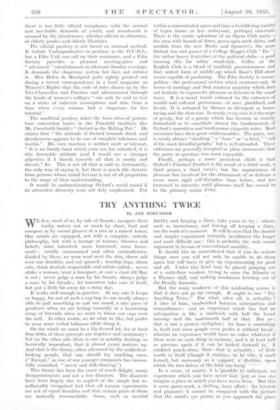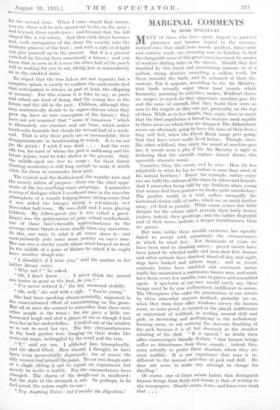TRY ANYTHING TWICE
By JAN" STRUTHER
WE 'live, most of us, by rule of thumb ; navigate these • tricky waters. not so much by chart, lead and compass as by casual glances at a tree or a ruined tower. Our , minds are equipped, not with a complete, orderly philosophy, but with a farrago of axioms, theories and beliefs, some inherited, some borrowed, some home- made ; mostly unexamined and: often contradictory. Guided by these, we wear wool next the skin, throw salt over our. shoulder, and eat spinach ; worship dogs, abuse cats, think dentists respectable and artists raffish ; never 'strike a woman, trust a foreigner, or cast a clout till May is out ; never judge a man by his friends, always judge a man by his friends ; let tomorrow take care of itself, but put a little bit away for a rainy day.
It works well enough in practice. At any rate it keeps us happy, for out of such a rag-bag we are nearly always able to pull something to suit our mood, a nice piece of prudence when we are feeling cowardly or a heartening scrap of bravado when we want to throw our caps over the mill. ' In other words, we do what we like, but prefer to wear some verbal talisman' while doing it.
On the whole we must be a lily-livered lot, for at leaSt four-fifths of these precepts are'. negative and cautionary ; but on the other side there is one so notably dashing, so heroically imprudent, that it almost evens matters up. And that is the theory, often advanced by the unlikeliest- looking people, that one should try anything once. (" Except," as one of our. younger composers has immor- tally remarked, " incest and folk-dancing.") ' • This theory has been the cause of much delight, many disappointments and not a few disasters. The' disasters have been largely due to neglect of the simple birt in- .sufficiently recognised fact that 'all human experiments are not of equal duration and that certain 'pairs of thein are mutually irreconcilable. Some, such as marital fidelity and keeping, a diary, take years to try ; others, such as ineonstancy and leaving off keeping a diary, are the work of a, moment. It will be seen that the shorter and simpler experiment instantly invalidates :the longer and more difficult one : this is probably the only sound argument in favour of conventional morality... . .
It shonld. also be remembered that if you .do certain things once you will not only .be unable Jo .4o them again but have, to give up, experimenting for good and all LInder this bead may be placed, jumping out of a sixth-floor window, trying; to cross the Atlantic in a Thames skiff, and making mushroom ketchup out of the Deadly Amanita.. _ But the main, weakness, of this misleading, axiom is that it does not go far enough. It ought to run " Try Anything Twice." For what," after all, is actuality ? A slice Of ham, sandwiched between 'anticipations and remembrance : and an experience which has– had no anticipation is like a sandwich with half the liread Missing—and the underneath half at that.. But no ; that is' not a perfeet, metaphor ; for ham otiriShing in itself and some PeOple even prefer it without breti'd : _ ve wlaii ev er if Whereas an experience 'iv 11 1atve no alu there were no' such thing us memory, and is at lcasi half as precious again if it can he ktokcd forward ,crinkled" peachstOne, then 'Hutt is actuality of little worth in itself' (though it contains, to he Snre, s'inall kernel), but necessary as a, support, skeleton, upon which the two halves of the friiit can hang,.
In a sense, of course, it Is "po,;sililc. to. aiilicipatc 'an experience which' yon haVenever laid, just Its you can imagirie'a place to which you have never licen. Rut this Is mere guess-work, a shifting, hazy affair: for interest and piquancy it cannot be compared with th(, picture that• the mind's eye paints as you approach the place for the second time. When I come round that corner, You say, there will be nets spread out to dry on the quay ; and beyond, three carob-trees. ; and beyond that, the hill shaped like a cat asleep. And then each detail becomes real, each corrugation of the stone fits exactly into the intricate grooves of the fruit ; and.with a sigh of delight you give yourself up to the present. But it is a present enriched by having been consciously a future ; and you !know that as soon as it is over the other half of the peach will be waiting for you.to eat, fitting just as miraculously on to the. crinkled stone.
- To object that the two halves are not separate but a complete sphere is merely to reaffirm the undeniable fact that anticipation is always, in part at least, the offspring of memory. For this reason it is false to say, as poets and others are fond of doing, that the young live in the future and the old in the past. Children, although they may academically decide to be engine-drivers when they grow up, have no true conception of the future ; they have not yet acquired that " sense of tomorrow " which is. alternately our comfort and our bane, which makes tooth-ache bearable but clouds the second half of a week- end. That is why their griefs are so inconsolable, their disappointments so heartrending to watch. It is too wet for the picnic; I wish I was dead: . ti . And the very old, too, for most of whom the past is saddening and the future jejune, tend to take shelter in the present. Only the middle-aged are free to range : for their future (barring accidents) is still long enough to make it worth While for them to reconsider their ;past.
The cynical and the disillusioned, the worldly-wise and the merely infirm of purpose---these are the chief oppo- nents of the try-anything-twice campaign. I remember a scrap of dialogue which I overheard once in the macabre atmosphere of a seaside lodging-house sitting-room (but_ it Was called the lounge) during a relentlessly 'wet November half-term. My own child and I were playing. Gibbets. My fellow-guest (for it was called a guest- house) was the quintessence of prep.-school motherhood, one of those approximations to the hair's-breadth . average 'whbse thrust is more deadly than any caricature. So this, one says, is what it all comes doion to : and Surreptitiously puts some more powder on one's nose. Her son was a stocky youth whose mind harped 'On food. In the Middle of a game of Halma he asked if he might have another dough-nut.
", I shouldn't if 'I were you," said his mother in her rather dreary' voice. " Why 'not " he asked. Oh, I don't know . . . I never think the second " one tastes as good as the first, do you ? " ' I've never noticed it," the boy answered stolidly.
Oh,' well," she said with a sigh. " You're young."
She had been speaking absent-rnindedly, engrossed in the unaccustomed effort of concentrating on the game. But all at once she seemed to remember that there were other people in the room for she gave a little em- „b ;. a glance at, me as though I had em- barrassed laugh, and shot Seen her in her underclothes. I looked out of the window so as not to meet her eye, The late chrysanthemums in the back garden were . hanging on their stalks like worn-out mops, bedraggled by the wind and the rain. ” T," said my son. I, gibbeted him, triumphantly, and the dotal lifted. How, absurd, I thought, to have been even momentarily depressed .: for of course the silly woman ha missed thepoint, To eat two dough-nuts at a single , sifting is not to, repeat an experiment but merely to invite a surfeit. For the circumstances have changed. The charm of the dough-nut is unaltered : katt the state of the stomach is not. So perhaps, to be . fool-proof, the axiom ought to run. : ". Try Anything Twice : but Consider the. Digestion:



































 Previous page
Previous page